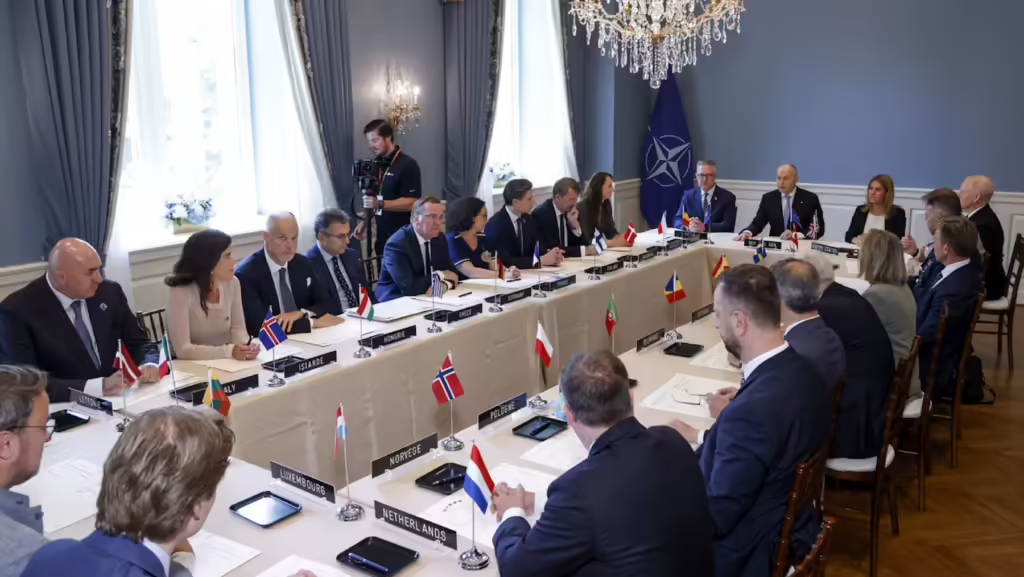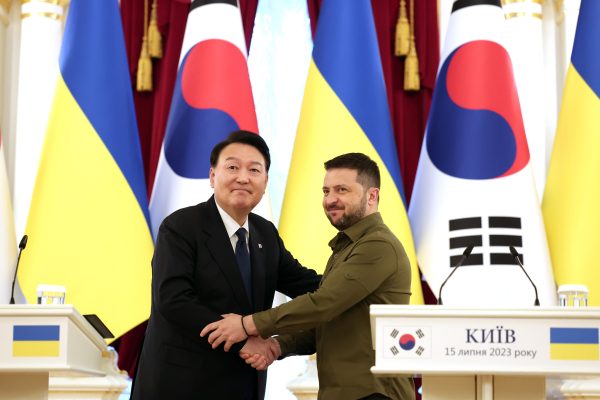Allied government and industry officials met at the US Chamber of Commerce NATO Defense Industry Forum July 9, 2024. (Photo: US Chamber of Commerce)
WASHINGTON — Following this week’s NATO summit here, the 32 allies are planning to build a first-ever commercial space strategy to speed new technologies to their militaries — based in part on recommendations put together by a government-industry working group sponsored by NATO and the US Chamber of Commerce.
“The focus of our conversation was that NATO plans to build a commercial space strategy, and that this conversation was to provide inputs to that team,” Mike Greenley, CEO of Canada’s MDA Space who chaired the joint working group, said on Tuesday.
“The threats are real, and they’re going to be fast. And so there’s a pace of technology and capability, innovation and scaling that needs will occur in the space sector. In order to have speed, the ability to leverage the commercial sector and commercial relationship with the industry, in space capability — especially things like observation, communications and the like — is going to be essential,” he told the Chamber’s NATO Defense Industry Forum.
The forum, according to a fact sheet on the US Chamber’s website, was “the first-ever NATO endorsed working conference between leading defense industry business leaders, allied defense ministers, and top NATO officials to boost defense production and transatlantic industrial cooperation.” It was organized “in collaboration with NATO and the White House,” the fact sheet added.
Indeed, senior alliance officials, including outgoing NATO Secretary General Jens Stoltenberg and Deputy Defense Secretary Kathleen Hicks, used the forum to roll out a new industrial pledge that includes future joint development programs.
The forum also featured five working groups focused on aspects of allied industrial needs: munitions and air defense production capacity; technology innovation; strengthening cyber defenses; adopting and adapting to artificial intelligence; and space capabilities.
“Each working group’s findings and proposed policy changes for the alliance will form the basis for NATO’s policy work beginning this Fall and will have a lasting impact over the next two years,” the Chamber fact sheet explained.
Greenley told the forum audience that the space working group had “good diversity,” including representatives of the US, Finland, Spain, Luxembourg and France.
A key finding, he said, was that NATO needs to establish an “industry interface” for engaging allied companies, including to explain that NATO is a “coordinator, not an independent actor” when it comes to space systems acquisition. Such an “entry point” to NATO will be important, he explained, “so the industry, of all shapes and sizes, and multiple countries, can know where to go to interface and introduce commercial capability into NATO capabilities.”
Another finding, Greenley said, is that NATO needs to make allied “demand signals” clear so that space companies can plan their own investments to be able to “scale to meet the necessary requirements and the demands.”
Echoing concerns addressed by the US Defense Department’s recent commercial space strategy, the group noted that key challenges include the need for more streamlined procurement rules to allow acquisition to keep up with innovation, and finding a balance between security, including cybersecurity, requirements and the rapid pace of commercial innovation, he noted.
In addition, Greenley added, the group found that NATO needs to work to improve common space situational awareness, and from there to figure out better ways to protect space assets including those of commercial firms. Like in the US, part of that conversation flowed around ways in which allied nations could help commercial firms find “financial protection” for the risks they take in embedding their systems with military activities.
The growing importance to NATO of space capabilities is firmly on the agenda for the 75th Anniversary Summit, from July 8-11, as well as on the minds of US congressional leaders.
A congressional delegation, led by Reps. Mike Rogers, R-Ala., and Adam Smith, D-Wash., chairman and ranking member of the House Armed Services Committee, returned on Monday from a trip to Luxembourg, France and Italy to discuss allied space security cooperation.
“This was the first international delegation to focus primarily on National Security Space issues,” the two HASC leaders said in a joint statement.
“If we are going to counter this increasing threat, we must work with like-minded allies and partners,” the statement added. “Ultimately our success is going to depend on how well we work together via bilateral agreements and multilateral alliances, like NATO, to build resiliency and support deterrence in space. Capabilities like space situational awareness will be foundational and should be coordinated.”
Rogers and Smith were accompanied by Reps. Stephanie Bice, R-Okla., Donald Norcross, D-N.J., Gary Palmer, R-Ala., Veronica Escobar, D-Texas, and Jimmy Panetta, D-Calif.





















Discussion about this post